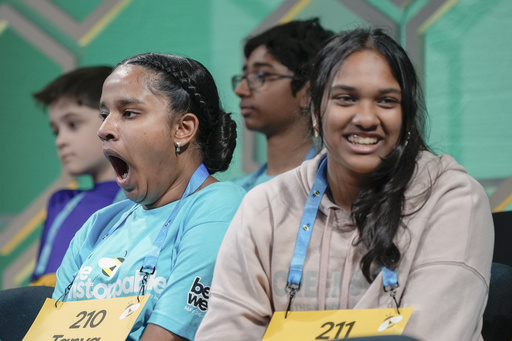OXON HILL, Md. (AP) — When Achyut Ethiraj’s final appearance in the Scripps National Spelling Bee ended far earlier than he anticipated, the 14-year-old grimaced at the microphone, walked off the stage quietly and exited the ballroom with his mother’s arm draped around his back.
Achyut had plenty of company among the 140 spellers eliminated on Wednesday, spelling’s saddest day.
“I didn’t expect to get out, but I did, and I guess I have to accept the truth now,” said Achyut, an eighth-grader from Fort Wayne, Indiana. “I’m happy to do high school and do other things, but I’m kind of confused what to do now that I’m done with spelling.”
“It’s my last year, and I expected to do better, but I guess it is what it is,” he said. “And I have to move on.”
The structure of the spelling bee has undergone plenty of changes over time, but over the past three years under executive director Corrie Loeffler, the competition has gotten very hard, very fast for spellers who make it past the preliminary rounds.
The morning began with 148 spellers. By the end of the first quarterfinal round, there were 59 left, and 46 of those got through a vocabulary round to reach the semifinals. By the end of the day, eight finalists remained. They will return Thursday night, when the winner will receive a trophy and more than $50,000 in cash and prizes.
The champion won’t be Shradha Rachamreddy, who finished third last year and was a consensus favorite to go all the way. She was eliminated on exactly the sort of “super short, tricky word” she said she concentrated on studying after misspelling “orle” last year. This year it was “varan,” a type of lizard. She added an extra “r,” and former spellers in the audience gasped at her mistake.
“I am in shock and despair,” said Dev Shah, the 2023 champion.
“We all thought she was going to win,” added Charlotte Walsh, last year’s runner-up.
Starting in the quarterfinals, the bee’s word panel can use any of the more than half a million words in Webster’s Unabridged dictionary, plus some geographical names that aren’t even listed in that volume. While the panel tries to maintain a consistent level of difficulty in each round, it can vary from word to word.
That’s when luck comes into play.
Achyut was asked to spell the word “sistine.” Derived from the Sistine Chapel, it’s an adjective meaning “a light blue color.” He went with “cistine,” and his coach, Grace Walters, was second-guessing herself.
“I’m sure when I was making my lists, I just assumed, ‘Oh, everybody knows the Sistine Chapel.’ But the reality is these kids are like 10 to 14. They might not have the … cultural knowledge that us older people have,” said the 22-year-old Walters, a former speller. “So that’s definitely something I feel like I overlooked in helping him prepare.”
Two years ago, Achyut finished in a tie for 14th place, and last year he tied for 23rd. This year, he tied for 60th place alongside the 88 others eliminated in the round.
“My rank has been going lower. But the reality is my preparation has been increasing a lot,” Achyut said. “And I don’t know how that matches up, but I know that I know the words and I deserve a good break.”
He has plenty of company. Rare is a speller like Vanya Shivashankar, who came in with enormous buzz in 2015 after years of strong finishes and ended up winning. Even Shivashankar had a setback the previous year when a written spelling and vocabulary test kept her out of the finals.
Naysa Modi, the 2018 runner-up, didn’t make the finals the following year. Ishika Varipilli, who hoped to make a run at the trophy this year in her third and final attempt, bowed out in a tie for 47th after missing a vocabulary word, “swanky,” and said afterward she was “trying to keep it together.”
In the semifinals, Shradha was followed to the exit by two more top-ten finishers from 2023: Aryan Khedkar and Sarah Fernandes. Aryan got a long hug from fellow competitor Faizan Zaki before leaving the stage.
“These kids put a lot of pressure on themselves. I think they get nervous. They get worried. They get more focused on, ‘What if I don’t make it? What if this happens? What if that happens?’” Walters said. “The kids feel it around them that, you know, they’re being looked up to as previous finalists, previous semifinalists, and they internalize that people expect something from them.”
Aliyah Alpert, who finished ninth in 2022, missed the bee entirely last year because she flubbed the word “recoup” in the Yavapai County spelling bee in her home state of Arizona.
“It was on-list, I totally knew the word, but I blanked. Choked,” said 13-year-old Aliyah, who returned this year and was ousted in the semifinals.
Matthew Bader came in knowing he might not improve upon his finish last year, a tie for 57th.
“The farther you make it in the competition one year, that’s the more chance you’ll do worse next year,” said Matthew, a 14-year-old from Peachtree City, Georgia. “Actually, I didn’t really mind getting out. Win or lose, to be here, it’s a pretty big accomplishment.”
Ananth Chepuri of Bradenton, Florida, thought his daughter, 11-year-old Amara, was eliminated by one of the most difficult words (“ephectic”) of what he called an inconsistent round.
“It’s been brutal,” Chepuri said. “The first kid, I felt so sorry for him. This was a bloodbath!”
___
Ben Nuckols has covered the Scripps National Spelling Bee since 2012. Follow him at https://x.com/APBenNuckols



